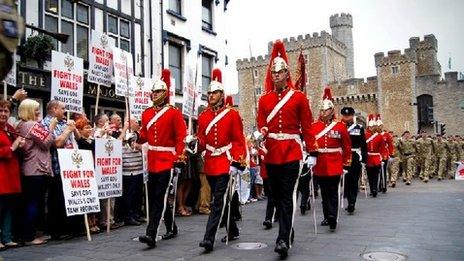Welsh regiments wait to hear fate in Army reorganisation
- Published

The Queen's Dragoon Guards - or Welsh Cavalry - recently took part in the Queen's Diamond Jubilee celebrations in Cardiff
Three Welsh regiments - the Queen's Dragoon Guards, the Royal Welsh and the Welsh Guards - are waiting to find out if they could be cut or merged in an overhaul of the Army.
Supporters of the Queen's Dragoon Guards, known as the Welsh Cavalry, have campaigned to save their regiment.
But it is now suggested the Royal Welsh may be at greater threat of cuts, and two battalions may be merged into one.
The Ministry of Defence is to cut the soldier numbers from 102,000 to 82,000.
The Queen's Dragoon Guards (QDG), are based in Sennelager, Germany, and act as a vehicle-based reconnaissance unit.
The Royal Welsh has two battalions, 1st Royal Welsh based in Chester and 2nd Royal Welsh at Tidworth in Wiltshire, while the Welsh Guards are currently based in Hounslow, west London.
As part of the infantry, it has been suggested that regiments of this sort are more useful to a modern army than a cavalry regiment like the QDG.
But supporters of the regiment have argued that the history, strong links with Wales and high levels of recruitment from the country, plus the fact it is the only Welsh cavalry unit, mean it needs to be preserved from amalgamation.
Bridgend MP Madeleine Moon claimed last month that decisions about where to make the cuts were being influenced by political rather than military considerations.
She told the BBC that Downing Street had told the Ministry of Defence not to touch Scottish regiments because of a concern about public reaction to any such move during a vote on independence.
Are Welsh regiments at risk in the Army review?
She said: "What I'm not happy about is hearing that there are political implications being taken into consideration in relation to which regiments will go.
"We've heard that a message has come out of Downing Street telling the Ministry of Defence not to touch the Scottish regiments because they don't want to influence the vote on independence. So that means we're more vulnerable."
Major Howard Smith, who served with the Welsh Cavalry for 32 years, was one of the founder members of the Save the Welsh Cavalry campaign.
His circumstances are typical of many members: he and his brother were in the regiment at the same time along with five members of Major Smith's class from school in Bargoed.
"There were lots of people from my area who joined before me and lots of younger ones who came on after," he said.
He is quietly confident that the vocal campaigning to save the Welsh Cavalry will have been effective, saying: "I'm cautiously optimistic.
"All the signs seem to indicate that we are OK, but as the saying goes, I ain't seen no fat lady singing yet.
"If we survive these cuts then the regiment will continue pretty much as they are."
He added there would be an ongoing reorganisation of the Royal Armoured Corps which the Queen's Dragoon Guards came under.
When asked about the relevance of the Welsh Cavalry today, Maj Smith replied: "We have had these arguments for many years. When I was on the battlefield, every single time I pulled up in my tank, the infantry were very pleased to see me."
Former servicemen Arfon Williams served for 30 years in the former Royal Regiment of Wales and then the Royal Welsh.
He said regimental pride was "utmost" among those serving in Welsh regiments.
He said: "It's like a family outside Wales. Where we go, the 'family' go. So you've got a little nook of Wales anywhere in the world."
- Published3 July 2013
- Published5 July 2012
- Published5 July 2012
- Published15 June 2012
- Published30 May 2012
- Published16 May 2012
- Published17 May 2012
- Published7 June 2012